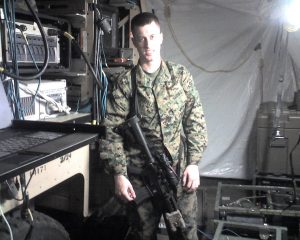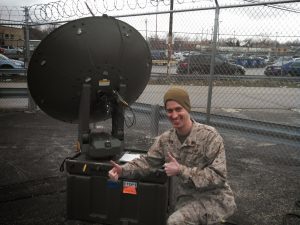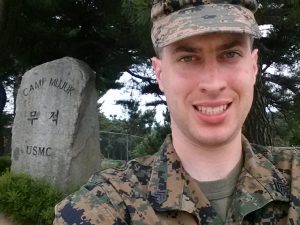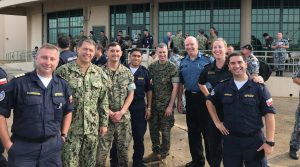Name: Tom Costello
Service: United States Marine Corps Reserve 2008-2018
Positions: Data Systems Technician, Data Systems Chief, Maritime Communications Watch Officer
Assignments:
- 2nd Battalion, 24th Marines, 4th Marine Division, Chicago, Illinois
- Headquarters & Service Battalion, Marine Forces Pacific, Camp Smith, Hawaii
I enlisted in the Marine Corps Reserve as soon as I was eligible in high school and left for bootcamp a few weeks after graduation. At the time, there was only one job involving computers available at the Chicago-based unit I was joining. As a life-long computer nerd, I wantedto learn military-grade cybersecurity and knew that position would allow me to do just that.
While many people think of the Armed Forces Reserve as a “one weekend a month, two weeks a year” obligation, it often becomes a much larger commitment. At a high level, being in the reserves versus active duty allowed me to join the Marines whilealso starting college and eventually maintaining a full-time civilian job. At the Chicago-based unit, it was not uncommon for some reserve weekends to be 3-4 days long. As a Data Systems Technician at an infantry battalion, almost everything related to technology was my responsibility.
During these long weekends throughout the Midwest, my main priority was setting up and operationalizing the “Combat Operations Center”, a tent full of computers linked to radios at a remote location. The unit’s leadership relied on this tent full of technology for sharing ground combat plans with hundreds of infantry Marines in the unit, communicating with supply & air support units, and maintaining field medical records. Setting up this center required a wide range of information technology skills.While we always benefitted from the climate controlled tents to keep equipment running (much to the disapproval of our friends in infantry roles), we would definitely feel the proverbial heat from commanding officers if they were unable to use equipment as expected. Despite those stresses, I truly believe I had one of the best roles in the entire USMC Reserve.

In 2011, around three years into my enlistment, our unit received a VSAT satellite kit that completely changed the unit’s data needs during our training periods. In addition to my “day job” as a full time student completing my bachelor’s degree in computer network technology from Davenport University, I aimed to learn everything I could about satellite computer networking to support the success of the unit. All that hard work paid off in July 2013 during a large training exercise in the middle of the Mojave Desert. By that time, I became the unit’s Data Systems Chief and my small team of reservist data Marines were able to get our satellite dish working before any other unit in the exercise. Although it wasn’t a competition, it also was no small feat in those extreme heat conditions. We ended up visiting many larger reservist units to help fix their satellite network equipment during that trip, which was funny as usually the infantry battalions are the ones receiving assistance from those larger units, not the other way around.

I briefly left that Chicago unit to focus on completing my master’s degree in Information Resource Management from Central Michigan University, but returned in 2015 to join them on a trip to South Korea. Everything went wrong on the satellite network gear while we were overseas, but training with the Republic of Korea Marines was one of the best memories I had in the military. 2016 was very odd as I had to transfer out of the Chicago unit to re-enlist, which led to me join a much larger Hawaii-based unit after getting promoted to Staff Sergeant. I spent most of July 2018 at Pearl Harbor during the Navy’s RIMPAC exercise, serving as one of the Maritime Communications Watch Officers. Our responsibility was to ensure any communications equipment issues during the exercise got resolved quickly, which involved working alongside US Navy, Canadian Navy, New Zealand Navy and Chilean Navy colleagues. The first few days of the exercise were challenging as working an international maritime exercise was completely different than working at an infantry battalion, but it was fascinating to see such a different side of the Marine Corps.

Shortly after that RIMPAC 2018 exercise, I left the military to focus on my civilian career. Every day at Argonne I still use the fundamentals of computer networks learned during my initial USMC Data Systems Technician training nearly 15 years ago. Today, the Marine Corps has a wide variety of roles that involve computers and technology. The days of only one job involving computers at a unit are long gone; there’s even new units that exclusively focus on cybersecurity! I personally benefitted from growing my network security skillset by competing in the National Collegiate Cyberdefense Competition during college and am thrilled to see these types of competitions sponsored by the DOE and DOD. Here at Argonne, I do my best to pay it forward by supporting the DOE Cyberforce Competition. I love that I can even continue building up my radio knowledge that began in the Marines as a member of the W9ANL Amateur Radio Club.

As an 18 year-old at bootcamp and then Marine Corps Communication Electronics School, I had no idea where my military service would take me professionally. I’m happy and proud to have found my professional home at Argonne National Laboratory where the knowledge, skills, and mindsets I developed in the armed forces are valued and celebrated.


